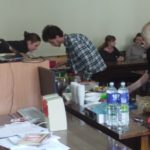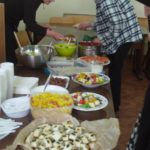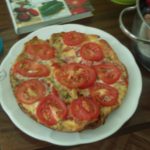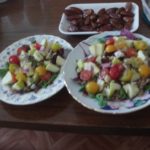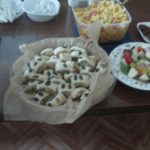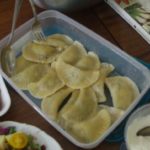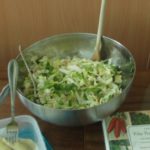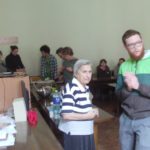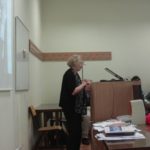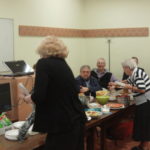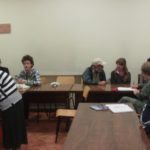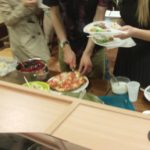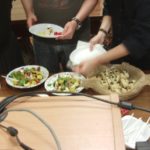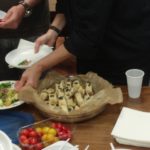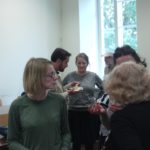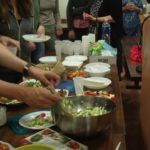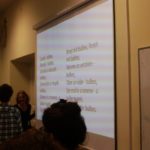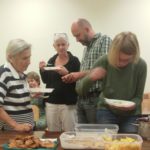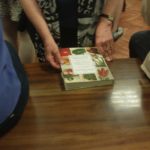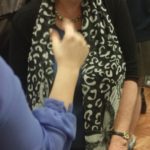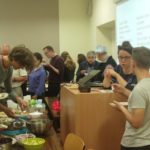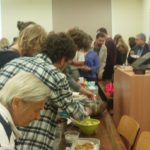
As another successful summer program of the Vilnius Yiddish Institute at Vilnius University wound down, writer Ellen Cassedy and the students, faculty and staff held a vegetarian potluck August 10.
Cassedy gave a brief presentation in Yiddish about the remarkable prewar vegetarian cookbook by Fania Lewando and spoke about her life and her vegetarian restaurant which was located on what is now Vokiečių street in Vilnius. Using slides Cassedy showed period photographs and pictures of foods featured at the restaurant, occasionally clarifying her remarks in English.
A full classroom of perhaps 30 people listened intently as latecomers filtered in, some bearing plates and bowls of food. A long table in front of the podium enticed the eye with a variety of dishes made by the students and staff themselves.
As a local Lithuanian man took photographs and filmed from various vantage points in the room, the students who had made food for the potluck each took turns trying to describe their dish in Yiddish. A sort of comedy of errors ensued as the two native speakers of Yiddish in the room attempted to make sense of “melon-latkes” and similar novel concoctions. VYI coordinator Indre Joffyte’s offering was almost instantly translated from “cauliflower” to “blumenkroyt,” and the spicy steamed cauliflower heads in a tangy, almost Indian sauce (or was it pickled cauliflower in a curry sauce?) later turned out to be the tastiest item by far at the table that afternoon.
Slowly the comedy of errors became a sort of game of charades and then a game show, and a fun learning experience. After the dishes were introduced everyone lined up at the table and piled heaps of kashe, latkes, pumpkin-seed pastry and quiche onto plastic plates and ate mainly standing up in small groups around the classroom. Many went back for second and third helpings, and by the time professor Dov-Ber Kerler arrived there was only salad left, which he declined, saying he had already had lunch.
Professor Abraham Lichtenbaum of Argentina, the other main instructor at the VYI summer courses with Keller, gave an interview to the LJC webpage a few years ago. Asked what has changed since then, Lichtenbaum said this year’s crop of students were much better. In what sense? Did they come with prior knowledge of Yiddish? Lichtenbaum teaches the third and fourth level students, so of course his did arrive with prior knowledge, but even the beginner students were better because they were so eager to learn and so capable of studying, he said. What about the number of students, has it declined? No, Lichtenbaum said, the number is up over last year’s summer course. What about the average age? Much younger this year, many more young people are coming to study Yiddish. Asked about countries of origin, Lichtenbaum rattled off a list including Austria, Britain, Spain, Poland and even Ukraine, besides students from North America.
Ellen Cassedy continued to mingle among the potluck-goers talking about Fania Lewando and showing a republication of her vegetarian cookbook published by Alma Littera in Vilnius in 2015.


